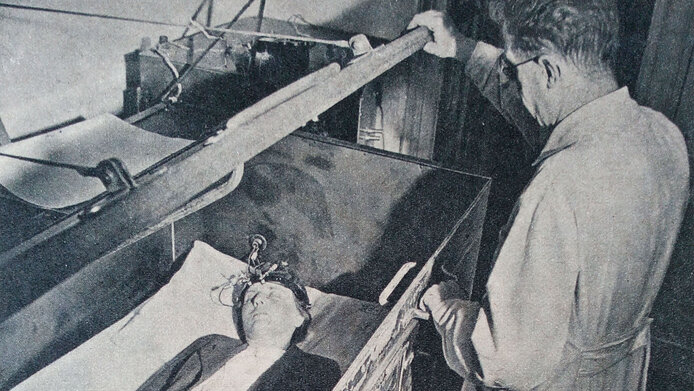Austrian Psychology during the National Socialist Era

"It is a sad fact," says psychologist Gerhard Benetka from the Sigmund Freud University Vienna "that applied psychology flourished during the National Socialist era – and the history of Austrian psychology after the ‘Anschluss’ in 1938 has not yet been systematically documented." Benetka identifies the main reason for this as the fact that psychology is still trying to present itself as a victim of National Socialist science policy. This is justified in part: for example, almost the entire Psychological Institute of Vienna established by Karl and Charlotte Bühler was forced to emigrate. What tends to be forgotten, however, is that psychology was used for a variety of applications outside the university during the National Socialist period. As part of a recently launched project supported by the Austrian Science Fund FWF, Benetka is carrying out a comprehensive examination of this patchily researched period in the history of Austrian psychology.
Practical psychology
The focus of the project is on the links between National Socialist policies and developments within the discipline of psychology. Preliminary research has shown that psychologists willingly put their expertise at the service of the regime's racial and war policies, e.g. in the selection of German army officers, in the testing of the suitability of prisoners of war for working in the munitions industry and, in the context of welfare and health policy, in the classification of children and young people as "aufwandunwürdig" ('unworthy of expenditure'). "The full extent of this practical application of psychological knowledge is still unknown," says Benetka. "In the German army alone, around 450 psychologist positions were created in 1942. Because there were too few psychologists available, some of the positions had to be filled by teachers, for example."
Crimes against humanity
The project is dedicated above all to the role of psychology in the context of National Socialism's crimes against humanity. The use of psychological testing in the area of 'child euthanasia' is of particularly importance here. Thanks to the availability of new archive material, it is now possible to examine the prevalence of psychological testing in general: for example, the Bühler-Hetzer test – a diagnostic procedure for testing the children's development from infancy to pre-school age – was created at the Department of Psychology at the University of Vienna during the war and operated from there. The organisations that purchased the test can be identified from the institute's accounts. The main customer was the National Socialist People's Welfare service (NSV). "The NSV began to establish a kind of elite welfare system: services and payments should only benefit those who had been classified as worthy of support on the basis of their racial and genetic origins and their psychological development," explains Benetka.
Psychologists of the period
The research study also focuses on the career strategies of the historical actors. As was the case in other disciplines, a variety of political stances and attitudes existed among the university-based representatives of psychology: from convinced Nazis and opportunists, who adapted their levels political activism to different situations, to professors who were known as open opponents of the regime. The case of Hubert Rohracher, for example, is interesting: "It appears that the army expected his EEG tests to yield results that would make an important contribution to the war effort," says Benetka. "His appointment as professor at the University of Vienna shows that in a context of 'total war', the prospect of research results that could be used for military purposes outweighed the reservations about the professor's ideological reliability." In late autumn 1940 Rohracher was due to be handed over to a concentration camp on account of his anti-Nazi views. He evaded the Gestapo, however, by volunteering for service at the front. Just two years later he was appointed professor of one of the most important institutes of psychology in the German-speaking world and his research was subsidised by the state.
New archive sources
Documents of the German Research Foundation DFG (Deutsche Forschungsgemeinschaft), the National Socialist People's Welfare NSV (Nationalsozialistische Volkswohlfahrt) and material from the National Archives and Records Administration in Washington, USA, are being consulted for the first time for this project. Background information will also be provided by interviews with contemporary witnesses. The results of the FWF project will be made available to both specialist and general audiences for the first time through publication in book form.
Personal details Gerhard Benetka is Head of the Faculty of Psychology at the Sigmund Freud University Vienna. His research interests include science studies, the theoretical (in particular philosophical) basis of psychology and the role of visualisation in science.
Related articles (in German)






